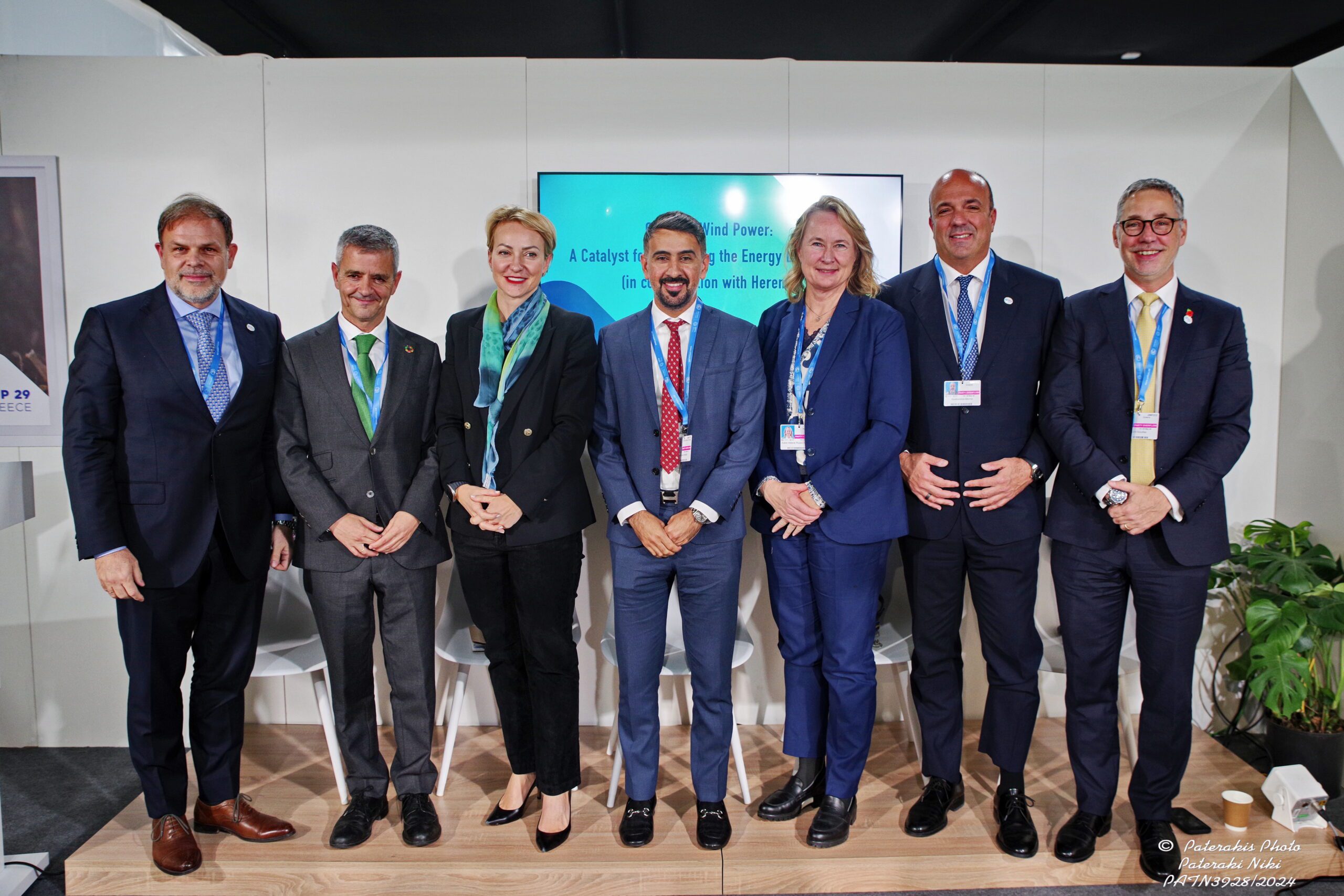Athens, 18 November 2024 – Foreign investment groups expressed their strong interest in Greece’s Offshore Wind Farms (OWF) during the event organized by the Hellenic Hydrocarbons and Energy Resources Management Company (HEREMA), in the context of this year’s 29th Conference of the Parties (COP29), hosted in Baku, Azerbaijan between 11 and 22 November.
The event took place on 14 November at the Greek Pavilion of COP29 and started with a fireside chat between Greece’s Deputy Minister of Environment and Energy, Alexandra Sdoukou, Belgium’s Minister of Energy, Tinne Van der Straeten, and the CEO of WindEurope Giles Dickson, which was moderated by the Chairman of the HEREMA BoD, Rikard Scoufias.
Ms. Sdoukou referred to the Greek State’s next steps regarding the implementation of the National Programme for the Development of OWF, setting as priorities the signing of the relevant Joint Ministerial Decision that will finalize the Organized Areas Development (OWFODA); engaging with local communities; and collecting necessary data from the upcoming wind and bathymetric surveys.
Ms. Van der Straeten highlighted the importance of offshore wind for Belgium, a country with a strong industry but lacking domestic energy resources. The Minister explained that despite Belgium’s small coastline, her country has already succeeded in developing offshore wind farms with a capacity of 2.2GW, ranking second globally in terms of wind capacity per capita. Belgium’s next goal, according to Ms Van der Straeten, is to triple said capacity, leveraging the sector’s multiple benefits: “From the construction and maintenance of OWF to training and certifying personnel, offshore wind can develop a whole new economy,” she said. And she concluded by stressing the involvement of local communities in developing such projects in order to ensure their success.
The need for offshore wind tenders to be designed with maximum transparency, following the CfD model that provides investors with the necessary guarantees to finance projects, was referenced by Giles Dickson, CEO of WindEurope. He also noted that the annual capacity auctioned in Europe must consider the industry potential, and that small but clear steps are preferable to more extensive approaches.
The event’s second panel, moderated by the CEO of HEREMA Aristofanis Stefatos, comprised members of the investment community, who confirmed their interest in the Greek market – as per relevant statements from the representatives of Masdar and Iberdrola.
“We want to expand into offshore wind, leveraging the expertise of Terna Energy in the sector,” said Abdulaziz Alobaidli, Chief Operation Officer of Masdar, praising Greece’s National Programme for the Development of OWF. “The funds are there, but the competition internationally is strong, especially for investments in OWF that require more capital than other renewable technologies.” According to Mr. Alobaidli, Masdar plans to build a dynamic portfolio of offshore wind and PV investments in Greece and Spain, 6GW in total, as part of the company’s ambitious target of 100GW of renewable capacity by 2030.
Gonzalo Saenz de Miera, Global Director of Climate Change and Alliances at the Chairman’s Area of Iberdrola, with a 20-year presence in the Greek onshore wind market, also referred to the country’s attractive investment prospects. Mr. de Miera highlighted the advantages that Greece offers in the OWF sector, underlining three key conditions to attract further investment interest: minimization of business risk during the development phase; State support schemes and necessary clarity to facilitate the financing of projects; and creation of a local supply chain. “Investor competitiveness is ensured when energy is produced where it is cheapest,” he noted. Mr. de Miera also stated that over the next three years the Spanish group intends to invest a total of €15bn in renewable energy, 55% of which in the offshore market.
On his part, Konstantinos Mavros, CEO of PPC Renewables, shared that the pilot OWF project under development in Alexandroupolis will set the tone for future investments. He also added that the relevant studies (seabed, environmental, etc.) have already been launched, estimating that implementation will start within the next 18 months.
In closing, Astrid Rusås Kristoffersen, Director Group Research & Development of DNV, estimated that 72% of the total demand for green energy by 2050 will be for wind farms – onshore and offshore, either fixed-based or floating. She stressed, however, that grid capacity will play a key role in the whole endeavour; meaning that grids and network will have to be planned ahead, as they constitute major investments necessary to balance supply and demand. She also placed great emphasis on digital data protection and cybersecurity, highlighting the significant potential of AI in that area.
